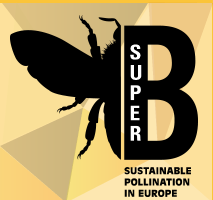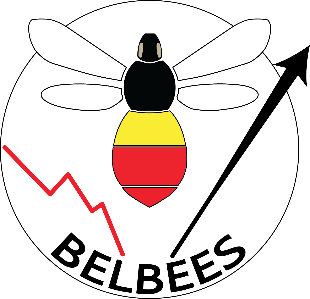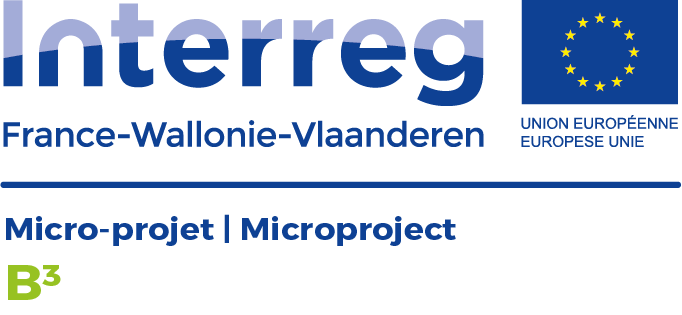Former projects
SUPER-B
Title. Sustainable Pollination in Europe: joint Research on Bees and other pollinators.
Funding. Cost action, European commission, 2014 -2018.
Partners. 29 European countries with different labs for each countries.
Contact. Denis Michez.
Abstract.
SUPER-B Super B will bring together scientific and societal communities involved in the conservation and sustainable management of ecosystem services mediated by pollinators. >70% of our crops need insects for optimal pollination; these include many fruits, nuts, oil crops, fibres and vegetables with some producing no yield without insect pollination. The direct economic value of crop pollination by insects in the EU is >14 billion euro annually. Moreover, >80% of wild plant species benefit from animal pollinators for fruit and seed production, making pollination a key service for ecosystem and biodiversity maintenance. SUPER-B will combine scientific evidence (existing and new knowledge) and social feedback for developing conservation strategies for pollinators. Specifically, the Action will (1) identify the role of insect pollination in agriculture and other ecosystems; (2) clarify best practices for mitigation of pollination loss, and (3) compare and contrast important drivers of pollinator loss (wild and managed species). SUPER-B will contribute towards maintaining natural ecosystems and achieving sustainable use of pollinators in agricultural production. Its results are relevant to all European countries and will be disseminated to a wide community of beneficiaries (scientists, farmers, beekeepers, industry, policy-makers, NGOs and the public).
More information at
http://superb-project.eu /
BELBEES
Title. Multidisciplinary assessment of Belgian wild bees decline to adapt mitigation management.
Funding. BR/132/A1/BELBEES, BELSPO (Belgian Scientific Politics), 2014-2018.
Partners.
UNamur (Prof. N. Dedoncker), UGent (Prof. G. Smagghe, Dr. I. Meeus), ULg (Dr. M. Dufrêne), RBINS (Dr. Jean-Luc Boevé) and UMONS (Prof. P. Rasmont).
Contact. Ella Zambra and Pierre Rasmont
Abstract. The laboratory of Zoology of Mons is in charge of the BELBEES project coordination, the wild bee data collecting and digitization, and the integration of stakeholders and policy makers. We will also test hypothesis of bee decline such as food resource depletion, landscape change or climate change.
Further information at
www.belbees.be
B³ – Bed and Breakfast for Bees
Funding : This project (micro-project) is part of the INTERREG V France-Wallonie-Vlaanderen program and is funded by the FEDER for a duration of 18 months.
Partners : IDEA : Agence de développement territorial du Cœur du Hainaut (Project leader, Belgium), Communauté de Communes Pévèle Carembault (France), UMONS : Laboratory of Zoology (Belgium).
Contact : Pauline Devos – IDEA (Pauline.devos@idea.be) , Denis Michez (UMONS)
Abstract: This project is part of the strategy of the IDEA and Communauté de Communes Pévèle Carembault to help local firms and companies to take actions for biodiversity. The B³ project is more specifically centred on wild pollinators such as wild bees, hoverflies and butterflies. Companies from Wallonia and north of France (4 of each) will be accompanied to make their working place more pollinator friendly and to be ambassadors of good practices for pollinators and biodiversity. The Laboratory of Zoology collaborates to this project by bringing expertise on wild pollinators and giving advice to the partners regarding the measures that are adapted and that can be implemented.
INTERACT
Title. International Network for Terrestrial Research and Monitoring in the Arctic.
Funding. EU FP7 project “Alpinobombus”.
Abstract. The project has a main objective to build capacity for identifying, understanding, predicting and responding to diverse environmental changes throughout the wide environmental and land-use envelopes of the Arctic. INTERACT also specifically seeks to build capacity for research and monitoring in the European Arctic and beyond, and is offering access to numerous research stations through the Transnational Access program. The laboratory of Zoology of Mons is involved in monitoring the bumblebee fauna in northern territories such as Alaska.
More information at
www.eu-interact.org
Life Herbage : Action prioritaire pour les pelouses et prairies en Lorraine et Ardenne méridionale
Abstract. The aim of this project is to restore and recreate more than 400 hectares of biodiversity rich grassland in Belgium by the year 2019. The laboratory of Zoology will collaborate in the scientific monitoring of sites with a focus on apoids communities.
More information at
http://www.life-herbages.eu
NSERC-CANPOLIN : The Canadian Pollination Initiative
Abstract. NSERC-CANPOLIN is a five-year NSERC Strategic Network that is addressing the growing problem of pollinator decline in agricultural and natural ecosystems in Canada. The laboratory of Zoology collaborated to this project by sharing numerous data on European bumblebee fauna. This mutual work already led to a meta-analysis characterizing the geographical distribution of bumblebees in the Northern hemisphere.
More information at
www.uoguelph.ca/canpolin/
Web Impact
Title. Impact of pollination web modifications in wild bee decline.
Funding. FRFC 2.4613.12, FNRS (Belgian National Funds for Research), 2012-2016.
Partners. UCL (Prof. A.-L. Jacquemart) and UMons (Dr. D. Michez, Prof. P. Rasmont and Prof. R. Wattiez).
Contact. Denis Michez, Romain Moerman and Nathalie Roger.
Abstract. By foraging pollen and nectar, bees are a key group involved in the stability of pollination webs and therefore, in the reproduction of Angiosperms. Decline of several bee species have been proved since decades and widely impact on the stability and functions of wild and agricultural ecosystems. States and causes of decline are poorly documented. The main factors are supposed to be from human activities but a few is known about interactions between these activities. We propose an original project by testing on ecologically different species the synergy of some factors likely driving bee decline. Moreover we will evaluate the loss of genetic diversity as ultimate cause of species extinction in Belgium. Our hypothesis is that modifications of host-plant ressources impact on individual development, their immonucompetence and their ability to resist to parasites, with ultimate consequence on population size reduction and loss of genetic diversity.
Publications.
Vanderplanck M, Moerman R, Rasmont P, Lognay G, Wathelet B, Wattiez R, Michez D, 2014. How does pollen chemistry impact development and feeding behaviour of polylectic bees ? Plos One, I.F. 3.7, PLoS ONE 9(1): e86209. doi:10.1371/journal.pone.0086209.
Maebe, K., Meeus I., Maharramov J., Grootaert P., Michez D., Rasmont P. & Smagghe G. 2013. Microsatellite analysis in museum samples reveals inbreeding before the regression of Bombus veteranus. Apidologie, I.F. 2.3, 44: 188-197.
Archi-Bio
Title. Archi Bio en ville.
Funding. Walloon Region, 2013-2014.
Partners. UMons (Prof. V. Becue, Dr. D. Michez and Prof. R. Wattiez).
Contact. Denis Michez.
Abstract. The main goal of this project is to alert the public from Mons University to the problem of bee decline and to propose new structure to host bees in cities. The originality of this project was to ask to the student of first bachelor in architecture to design new structure for bee nesting. These villages included structures for nesting and plantations for food resources. These new structures were then build and installed in the campus of architectural sciences.
STEP
Title. Status and Trends of European Pollinators.
Funding. 244090 – STEP – CP – FP, EU FP7 program, collaborative project supported by the European Commission.
Partners. 21 scientific partners from different European countries.
Contact. Pierre Rasmont.
Abstract. This project aim is to document the nature and extent of the pollinators decline, examine functional traits associated with particular risk, develop a Red List of important European pollinator groups, in particular bees and lay the groundwork for future pollinator monitoring programs. The laboratory of Zoology of Mons collaborates by sharing and gathering data on European wild bees (displayed on the Atlas Hymenoptera website lien vers www.zoologie.umh.ac.be/hymenoptera/) and producing the checklist of European bees. These data are currently used to develop the European Red List of bumblebees. Alongside to this substantive work, the laboratory also collaborates in the assessment of pressures driving the changes in pollinators, focusing on long term climate change modeling.
More information at
http://www.step-project.net
Specialization
Title. Ecology and evolution of host-plant specialisation in wild bees.
Funding. FRFC 2.4613.10, FNRS (Belgian National Funds for Research), 2010-2014.
Partners. ULG (Prof. G. Lognay), ULB (Prof. P. Mardulyn) and UMons (Dr. D. Michez and Prof. P. Rasmont).
Contact. Denis Michez.
Abstract. Pollination of flowering plant (Angiosperm) by bees (Hymenoptera, Apoidea, Anthophila) is among best examples of beneficial plant-insect interactions. However, despite their high economic and ecological impacts, the fundamental mechanisms explaining this interaction are still debated. The main goal of this project was to identify key factors driving host-plant specialization of bees. We focused on the following points: (i) origin of bees at geological level; (ii) evolution of host-plant choices in clades of specialist bees; (iii) chemical constraint in host-plant shifts. We considered bee-plant chemical communication, chemical composition of pollen, bee physiology and genetics to study explore these questions in different clade of bees.
Publications.
Vanderplanck, M., Michez, D., Vancraenenbroeck, S. & Lognay, G. 2011. Micro-quantitative method for analysis of sterol levels in honeybees and their pollen loads. Analytical Letters, I.F. 1.1, 44: 1807-1820.
Michez D., M. Vanderplanck & M. S. Engel 2012. Chapter 5. Fossil bees and their plant associates. Pp 103-164, in Evolution of Plant-Pollinator Relationships (Ed. Patiny S.). Cambrige University press, ISBN-13: 9780521198929.
Gosselin M, Michez D, Vanderplanck M, Roelants D, Glauser G, Rasmont P, 2013. Does Aconitum septentrionale chemically protect floral rewards to the advantage of specialist bumblebees? Ecological Entomology, I.F. 2.0, 38: 400-407.
Danforth BN, Cardinal S, Praz C, Almeida EAB, Michez D, 2013. The impact of molecular data on our understanding of bee phylogeny and evolution. Annual Review of Entomology, I.F. 11.4, 58: 57-78.
Dellicour S, Lecocq T, Kuhlmann M, Mardulyn P, Michez D, 2014. Molecular phylogeny, biogeography, and host plant shifts in the bee genus Melitta (Hymenoptera: Anthophila). Molecular Phylogenetics and Evolution, I.F. 4.1, 70: 412-419.
Vanderplanck M, Leroy B, Wathelet B, Wattiez R, Michez D, 2014. Standardized protocol to evaluate pollen polypeptides as bee food source. Apidologie, I.F. 2.3., 45: 192-204.
RARE
Title. Key factors for the persistence of fragmented populations of rare or declining plant species and their preferential pollinators: pollination patterns, inbreeding depression, gene flow and available resources.
Funding. FRFC 2.4540.09, FNRS (Belgian National Funds for Research), 2009-2013.
Partners. UCL (Prof. A.-L. Jacquemart), National Botanical Garden of Belgium (Dr. F. Van Rossum and Dr. O. Raspé) and UMons (Dr. D. Michez).
Contact. Denis Michez.
Abstract. The main goal of this project was to identify key-factors associated to the persistence of fragmented populations of four rare entomophilous plants sharing similar habitats and pollinators (Comarum palustre, Menyanthes trifoliata, Vaccinium oxycoccos and V. uliginosum). We considered various populations with different size, connectivity, habitat quality and landscape structure. We evaluated for each population: (i) pollinator community (species composition, abundance and host-plant specialization); (ii) plant reproductive success (seed set, fruit set, pollen flow,…) and plant genetic diversity.
Publications.
Somme L, Vanderplanck M, Michez D, Lombaerde I, Moerman R, Wathelet B, Wattiez R, Lognay G, Jacquemart A-L. Pollen and nectar quality drive major and minor floral choices of bumble bees. Apidologie, I.F. 2.3., in press.
Van Rossum F, Vereecken NJ, Bredat E, Michez D, 2013. Pollen dispersal and fruit production in Vaccinium oxycoccos and comparison with its sympatric congener V. uliginosum. Plant Biology, I.F. 2.4, 15: 344-352.
Mayer C, Michez D, Chyzy A, Brédat E, Jacquemart A-L, 2012. The abundance and pollen foraging behaviour of Bumble bees in relation to population size of Whortleberry (Vaccinium uliginosum). Plos One, I.F. 4.1, 7 (11): e50353.
Bee Village
Title. Bee village.
Funding. Belgian Lottery, 2009-2013.
Partners. Apis Bruoc sellae (M. M. Wollast), ULB (Dr. N.J. Vereecken), UGent (Prof. G. Smagghe) and UMons (Dr. D. Michez).
Contact. Denis Michez.
Abstract. The main goal of this project was to alert the general public to the problem of bee decline. The originality of this project was to construct three “bee villages” in three different campus in Mons, Brussels and Gent. These villages included structures for nesting and plantations for food resources. Many events were organized to visit the villages and the associated wild bees.
Publications.
Terzo M, Vereecken N. 2014. Un jardin pour les abeilles sauvages, comment les accueillir, les observer et les protéger. SPF Santé, Sécurité de la Chaîne Alimentaire & Environnement, Bruxelles, 52 pp.

